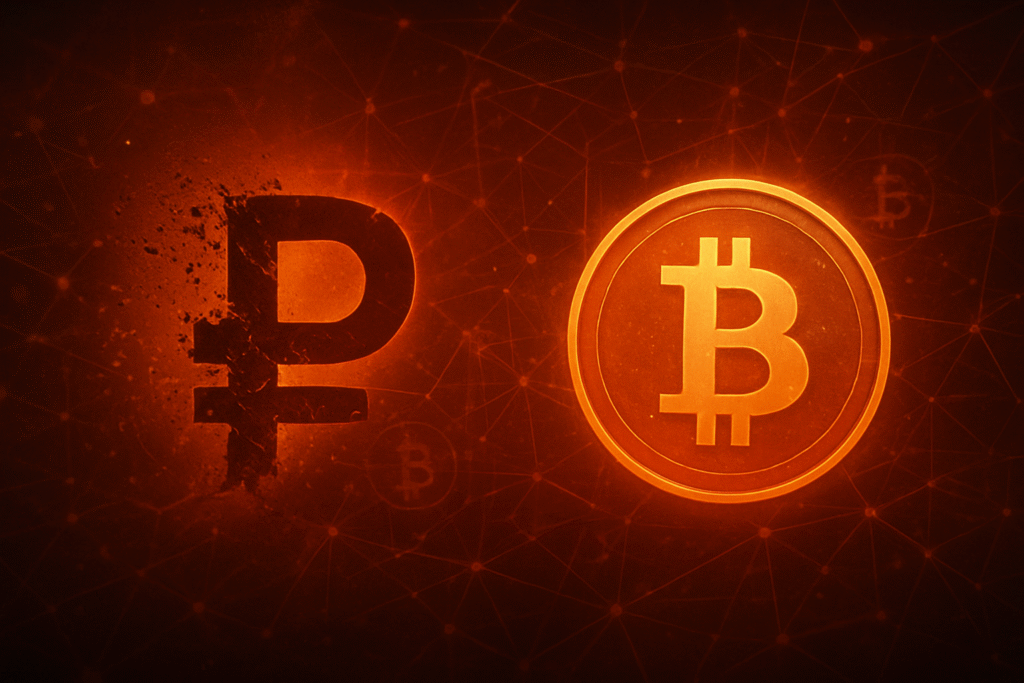
As of November 11, 2025, Venezuela continues to stand as a stark testament to the transformative power of cryptocurrency in the face of economic collapse. Years of unrelenting hyperinflation, driven by excessive money printing, oil mismanagement, and crippling sanctions, have decimated the national currency, the bolívar, pushing millions of citizens into a desperate search for financial stability. In this dire economic landscape, digital assets, particularly stablecoins like USDT (Tether) and Bitcoin (BTC), have emerged not merely as speculative investments but as essential tools for survival, enabling Venezuelans to preserve savings, conduct daily transactions, and receive vital remittances. This profound shift represents a critical real-world use case for cryptocurrency, offering a compelling blueprint for other economies grappling with similar hyperinflationary pressures and reshaping the global perception of digital currencies as a hedge against instability.
The immediate market reaction within Venezuela has been a sustained surge in crypto adoption, with digital assets becoming deeply embedded in the daily fabric of economic life. This widespread embrace underscores a fundamental community response: a collective pivot towards decentralized finance out of necessity, circumventing a failing traditional banking system and government controls. For the broader crypto ecosystem, Venezuela's experience highlights the intrinsic value proposition of digital currencies in providing financial inclusion and stability where conventional systems have failed, solidifying their role as a viable alternative in times of severe economic distress.
Market Impact and Price Action
The relentless devaluation of the bolívar has created a unique market dynamic in Venezuela, where cryptocurrencies, especially those pegged to the U.S. dollar, have become de facto stable stores of value. While specific price movements of affected tokens within the Venezuelan market are less about speculative trading against a strong fiat and more about their utility against a collapsing one, the demand for stablecoins like USDT has surged dramatically. Venezuelans are not primarily trading Bitcoin for profit in the traditional sense; rather, they are using it and stablecoins as a direct replacement for a reliable national currency. The annual inflation rate, estimated by the IMF to be around 270% by October 2025, makes any bolívar-denominated asset virtually worthless over short periods, driving an insatiable demand for crypto.
Trading volumes for cryptocurrencies in Venezuela have seen exponential growth, reflecting this necessity-driven adoption. Chainalysis reported a staggering 110% increase in cryptocurrency usage in Venezuela in the 12 months ending June 2024, ranking it 13th globally. By January 2025, crypto transactions had surged by 110% over the previous year, with an estimated $20 billion flowing into the Venezuelan economy via digital currencies, representing a significant portion of the nation's GDP. This volume isn't speculative; it represents real economic activity, from grocery purchases to salary payments. Platforms like Binance and Airtm facilitate much of this activity, acting as crucial gateways for Venezuelans to access and utilize digital assets. The "price action" for these assets within Venezuela is thus less about chart patterns and more about their consistent ability to maintain purchasing power relative to the U.S. dollar, a function the bolívar has long lost.
Compared to past events, Venezuela's situation echoes historical instances of hyperinflation where alternative currencies emerged, but with a modern, digital twist. Unlike physical foreign currencies which can be difficult to acquire and transport, cryptocurrencies offer unparalleled accessibility and ease of transaction, even amidst sanctions and capital controls. The sustained demand for crypto, particularly stablecoins, indicates that their "support level" is not a technical chart point but the absolute economic necessity of the population, making them resilient against typical market fluctuations within the local context. The primary "resistance" comes from government regulations or infrastructure limitations, rather than market sentiment.
Community and Ecosystem Response
The community response in Venezuela to the crypto surge is one of pragmatic adaptation and resilience. Social media platforms, while often used for political discourse, also serve as informal marketplaces and educational hubs where Venezuelans share tips on using crypto wallets, finding merchants who accept digital payments, and navigating the complexities of the crypto ecosystem. Sentiment is overwhelmingly positive towards cryptocurrencies as a lifeline, contrasting sharply with the despair surrounding the national currency. There's a strong sense of collective problem-solving, with individuals and small businesses actively promoting crypto adoption to ensure economic continuity.
Local crypto influencers and thought leaders, often operating through online channels, play a crucial role in demystifying digital assets and fostering trust. Their content ranges from basic "how-to" guides for setting up wallets and making transactions to more advanced discussions on security and stablecoin choices. This grassroots education is vital in a country where traditional financial literacy often doesn't encompass digital currencies. The effects on related DeFi protocols, NFT projects, or Web3 applications within Venezuela are still nascent compared to the widespread adoption of stablecoins and Bitcoin for basic transactions. However, the foundational understanding and infrastructure being built for basic crypto use could pave the way for future engagement with more complex Web3 applications as economic conditions stabilize or as the population becomes more digitally fluent.
Broader crypto Twitter and Reddit sentiment frequently highlight Venezuela as a prime example of cryptocurrency's real-world utility. The narrative often revolves around the humanitarian aspect of crypto, showcasing how it empowers individuals against oppressive economic conditions. While some in the global crypto community might view Venezuela primarily through an investment lens, the overwhelming sentiment regarding Venezuela is one of validating crypto's core mission: providing financial freedom and inclusion to the unbanked and underbanked, especially in regions suffering from severe economic instability. The challenges faced by Venezuelans, such as limited internet access and infrastructure issues, are often discussed, underscoring the ingenuity required to maintain a functioning crypto-based parallel economy.
What's Next for Crypto
The short-term implications for the crypto market in Venezuela are a continued entrenchment of digital assets as the primary means of transaction and savings. As hyperinflation persists, the demand for stablecoins and Bitcoin will likely remain robust, further solidifying their role in the daily lives of Venezuelans. The ongoing integration efforts, such as the initiative led by Conexus to launch a blockchain-based interbank network by December 2025, signal a pivotal shift. This move will allow Venezuelan banks to offer regulated custody, transfers, and crypto-to-fiat exchanges, providing a more structured and potentially safer alternative to the current unregulated stablecoin exchanges. This development could significantly increase mainstream adoption and trust, bridging the gap between the informal crypto economy and traditional finance.
In the long term, Venezuela's experience could serve as a critical case study and potential blueprint for other nations facing similar hyperinflationary pressures. The success (or challenges) of integrating Bitcoin into the traditional banking system will be closely watched. Potential catalysts to watch include further governmental recognition or regulation of cryptocurrencies, improved internet infrastructure, and the expansion of crypto-friendly businesses and services. The strategic considerations for projects and investors include focusing on user-friendly interfaces, robust security, and educational initiatives tailored to populations in economic distress. Projects that offer low transaction fees and high liquidity for local fiat (even if it's a rapidly devaluing one) will likely see greater adoption.
Possible scenarios range from a continued, albeit more formalized, parallel crypto economy to a more comprehensive integration of digital assets into the national financial system, potentially even influencing monetary policy. The likelihood of the latter increases with initiatives like the Conexus interbank network. However, challenges such as U.S. sanctions restricting transactions with Venezuelan banks and potential regulatory hurdles remain. The resilience of the Venezuelan crypto community, coupled with ongoing technological advancements, suggests that digital assets will continue to play a crucial and evolving role in the nation's economic future, offering a glimmer of hope amidst ongoing instability.
Bottom Line
For crypto investors and enthusiasts, Venezuela offers invaluable insights into the real-world utility and resilience of digital assets. It unequivocally demonstrates that cryptocurrencies are not just speculative instruments but vital tools for financial survival and inclusion in times of extreme economic distress. The ongoing adoption in Venezuela underscores the fundamental value proposition of decentralized, borderless money, serving as a powerful counter-narrative to criticisms that crypto lacks practical application. This situation highlights the long-term significance of stablecoins as a crucial bridge between volatile local currencies and the stability of global reserve assets like the U.S. dollar, albeit in a digital format.
The most important metrics to monitor include the growth in cryptocurrency transaction volumes, the number of businesses accepting crypto payments, and the success of initiatives like the Conexus interbank network in formalizing crypto integration. Key events to watch are any changes in governmental policy towards cryptocurrencies, the impact of international sanctions on crypto accessibility, and the ongoing development of local crypto infrastructure. Venezuela's journey with cryptocurrency adoption is a powerful narrative of innovation born out of necessity, offering profound lessons for the future of finance and the potential for digital assets to empower individuals in the face of economic adversity. The world watches as Venezuela continues to forge a path where crypto is not just an alternative, but a fundamental pillar of economic life.
This article is for informational purposes only and does not constitute financial or investment advice. Cryptocurrency investments carry significant risk.







